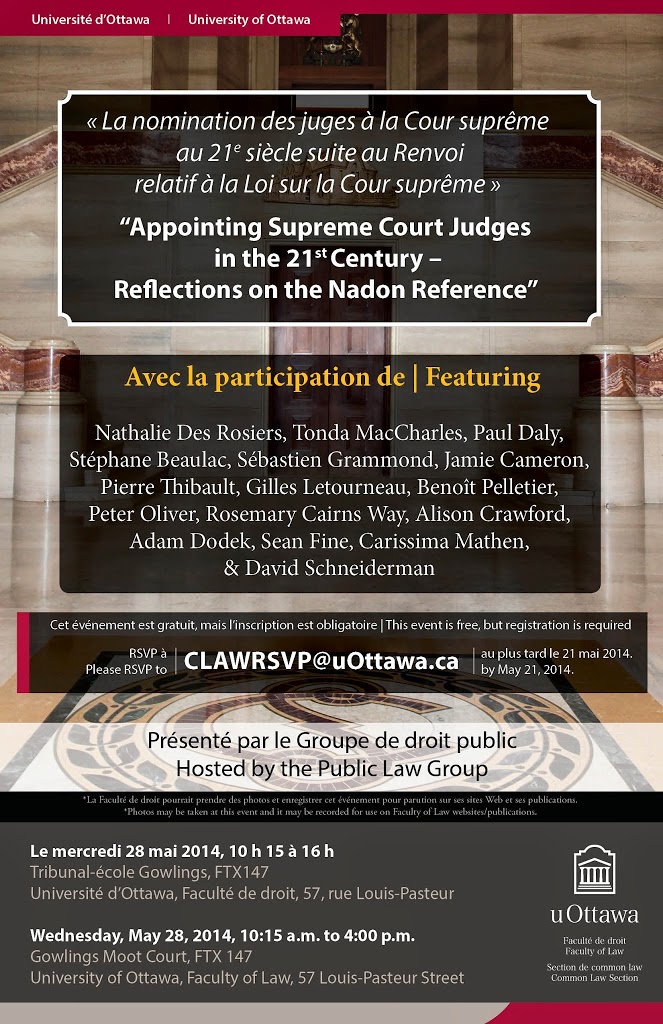2014
From Blogger
Legal Academia 2.0: New and Old Models of Academic Engagement and Influence
Quite a bit away from our usual fare, but my paper for the upcoming Symposium on the Nadon Reference draws on my experiences in the online world. Here is the abstract for Legal Academia 2.0: Across the country, legal and political aficionados hunched over their keyboards waiting for the announcement. Some were genuinely surprised by […] Read more
From Blogger
Won’t Someone Please Think of the Civil Servants: John Doe v. Ontario (Finance), 2014 SCC 36
By now, it is a familiar story. The standard of review is reasonableness. An exhaustive review of the relevant statutory language and factual matrices follows. And then there is a brief conclusion: the decision is reasonable or unreasonable.At the risk of beating a horse whose death certificate is now turning yellow and fraying at the […] Read more
From Blogger
Advisory Committees for Important Appointments: Does Trudeau’s Senate Plan Require a Constitutional Amendment?
APOLOGY: I worked on this post Thursday evening and hit “publish” on Friday. It did not appear until Saturday, however, and when it did, one of the drafts appeared. Here, fixed as of Monday May 12, is what I actually wanted to say. Apologies to anyone who got the half-baked version of my analysis. It […] Read more
From Blogger
Unreasonable Interpretations of Law — Final Version
The final pre-copy-edit version of my paper, Unreasonable Interpretations of Law is available for download from SSRN. I have made some revisions in response to comments. The paper will appear in a volume of the Supreme Court Law Review which will also be published as a stand-alone book, Administrative Tribunals and Judicial Deference in Canada: […] Read more
From Blogger
Administrative Independence: the Importance of Security of Tenure
Independence of administrative decision-makers is a variable concept, as Richard Revesz and Kirti Datla remind us: Structural differences between agencies result in different levels of independence. Seven structural features are traditionally associated with agency independence: removal protection, specified tenure, multimember structure, partisan balance requirements, litigation authority, budget and congressional communication authority, and adjudication authority. Some […] Read more
From Blogger
How (Not) to Conduct Deferential Review: Dionne v. Commission scolaire des Patriotes, 2014 SCC 33
The province of Quebec allows pregnant workers to exercise a right of withdrawal from dangerous work environments. At issue in Dionne v. Commission scolaire des Patriotes, 2014 SCC 33 was a supply teacher’s thwarted effort to exercise her right of withdrawal. A unanimous Supreme Court of Canada quashed the decision of the Commission des lésions […] Read more
Events From Blogger
Register Now for the Nadon Reference Symposium on May 28
More details here. Read more
From Blogger
Values, Rights and Remedies
Here is a radical suggestion from a 1997 essay by Peter Cane: “public law claimants should be free to specify the result they want to achieve by their claim and ask the court to provide an appropriate remedy”. The suggestion seems radical because courts sometimes tend to treat public law remedies as rather inflexible. Things […] Read more
From Blogger
Accrediting Discriminatory Law Schools: Ontario Says No
Hot off the press: the Law Society of Upper Canada (Ontario’s legal regulator) has rejected Trinity Western University’s application to be an accredited law school. TWU is a private, Christian law school located in British Columbia. Students must sign a ‘Community Covenant’ which requires them to make various commitments. As Jeremy Webber has explained: It […] Read more
From Blogger
Tort Law Meets Administrative Law Meets a Killer Whale
A tragic accident occurred in Seaworld, Orlando in 2010. A trainer interacting with Tilikum, a killer whale, was dragged underwater and killed. An investigation by the Occupational Health and Safety Authority ensued. Seaworld was found to have violated the duty to provide a safe workplace and lost its challenge to the order made pursuant to […] Read more
